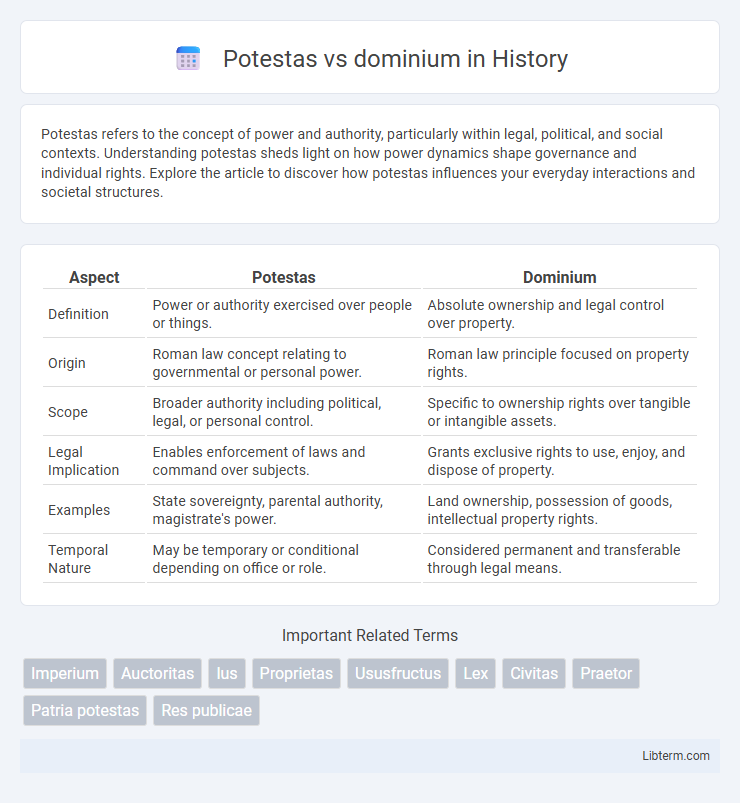Potestas refers to the concept of power and authority, particularly within legal, political, and social contexts. Understanding potestas sheds light on how power dynamics shape governance and individual rights. Explore the article to discover how potestas influences your everyday interactions and societal structures.
Table of Comparison
| Aspect | Potestas | Dominium |
|---|---|---|
| Definition | Power or authority exercised over people or things. | Absolute ownership and legal control over property. |
| Origin | Roman law concept relating to governmental or personal power. | Roman law principle focused on property rights. |
| Scope | Broader authority including political, legal, or personal control. | Specific to ownership rights over tangible or intangible assets. |
| Legal Implication | Enables enforcement of laws and command over subjects. | Grants exclusive rights to use, enjoy, and dispose of property. |
| Examples | State sovereignty, parental authority, magistrate's power. | Land ownership, possession of goods, intellectual property rights. |
| Temporal Nature | May be temporary or conditional depending on office or role. | Considered permanent and transferable through legal means. |
Understanding Potestas and Dominium: Definitions
Potestas refers to the power or authority granted to an individual to exercise control or influence over others, often linked to legal or governmental contexts, whereas dominium denotes outright ownership or dominion over property or assets with exclusive rights of use, control, and disposal. The key distinction lies in potestas representing delegated or conditional power, while dominium embodies full, sovereign ownership typically recognized in property law. Understanding these definitions clarifies their application in legal frameworks, especially in property rights and governance systems.
Historical Origins of Potestas and Dominium
The historical origins of potestas and dominium trace back to Roman law, where potestas referred to the legal power or authority exercised by public officials or family heads, while dominium signified absolute ownership rights over property. Potestas embodied the jurisdictional or authoritative capacity to command and govern, often linked to state or familial governance structures. Dominium established full control, including the right to use, enjoy, and dispose of assets, shaping the foundational concepts of property ownership in civil law traditions.
Potestas: The Nature of Authority
Potestas, rooted in Roman law, signifies the legal authority or power exercised by public officials or magistrates to enforce laws and maintain order within a state. It represents a form of delegated authority, distinct from dominium, which pertains to ownership rights over property. The nature of potestas entails the ability to command, regulate, and impose sanctions, emphasizing control over persons and governance rather than control over things.
Dominium: The Concept of Ownership
Dominium refers to the legal concept of ownership, signifying the absolute right to possess, use, and dispose of property without interference. It embodies full control and exclusive authority over assets, distinguishing itself from potestas, which denotes power or authority often limited to specific functions or relationships. In property law, dominium ensures the owner's entitlement to transfer, modify, or exclude others from the property, establishing the foundation for private ownership rights.
Potestas vs Dominium in Roman Law
Potestas in Roman law refers to the legal power or authority exercised by a person, often within family or state structures, such as the father's authority over his household (patria potestas) or magistrates' power. Dominium denotes absolute ownership and control over property, granting the owner rights to use, enjoy, and dispose of it without interference. The critical distinction in Roman law is that potestas signifies relational authority limited to people or offices, while dominium represents full proprietary rights over objects or property.
Legal Implications: Rights and Responsibilities
Potestas and dominium represent distinct aspects of property rights in legal theory, where dominium refers to full ownership entailing the exclusive right to use, enjoy, and dispose of property. Potestas, often seen as a form of control or power, grants certain rights or authority over property but falls short of transferring full ownership, limiting legal responsibilities and liabilities. The divergence in legal implications means dominium holders bear comprehensive duties, including maintenance and compliance with property laws, whereas potestas holders possess restricted rights, often subject to oversight by the dominium owner.
Potestas in Modern Legal Systems
Potestas in modern legal systems refers to the authority or power held by a public official or institution to enforce laws, regulate behavior, and make decisions within a defined jurisdiction. Unlike dominium, which denotes ownership or property rights over tangible or intangible assets, potestas emphasizes the legitimate exercise of governmental or administrative power. This concept underpins the functioning of state authority, administrative law, and the separation of powers in contemporary legal frameworks.
Applications of Dominium in Property Law
Dominium in property law refers to full ownership rights, encompassing the ability to use, enjoy, and dispose of property without interference. Its applications include transferring ownership through sale, inheritance, or gift, as well as enforcing exclusive possession rights against third parties. Dominium grants the owner legal authority to alter, lease, or encumber the property, distinguishing it from potestas, which involves limited or delegated control.
Key Differences Between Potestas and Dominium
Potestas refers to the legal authority or power one has over a person or thing, often linked to control without full ownership, whereas dominium signifies absolute ownership and full rights over property. Potestas typically grants limited rights, such as use or management, but does not confer the complete bundle of rights that dominium entails. Understanding these distinctions is crucial in property law, as dominium includes rights of possession, use, and disposition, while potestas represents more restricted, often fiduciary, powers.
The Relevance of Potestas and Dominium Today
Potestas and dominium remain crucial in contemporary legal discussions, defining the balance between authority and ownership rights. Potestas refers to the power or control exercised by individuals or institutions, while dominium signifies full ownership and proprietary rights over property. This distinction shapes modern property law, influencing regulations on use, transfer, and limitations of assets in both private and public sectors.
Potestas Infographic

 libterm.com
libterm.com